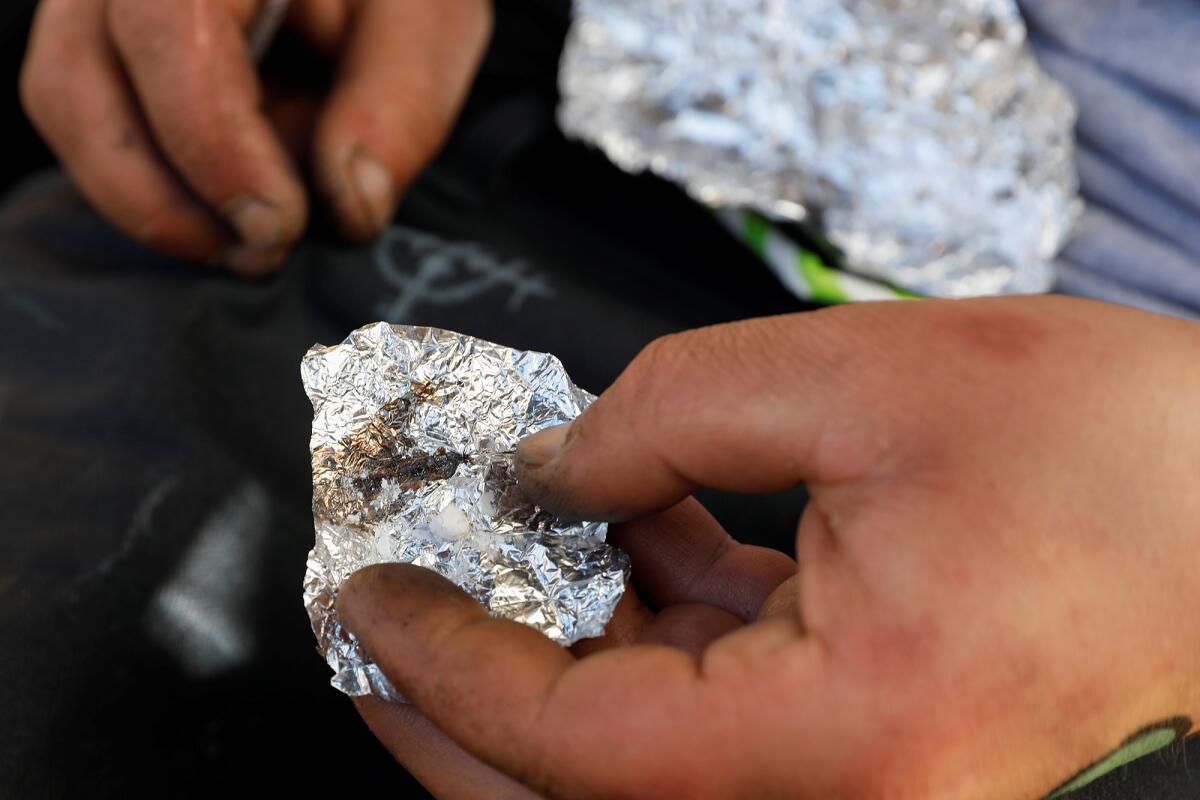Column: Prop. 36 risks creating felons instead of curing addictions

- Proposition 36 unfairly argues that mandating treatment for drug addiction and increasing penalties for theft will help with homelessness.
- The measure would change the rules of Proposition 47, approved in 2014, and turn some misdemeanors back into felonies.
Hello, and happy Thursday. There are 25 days until the election and today we interrupt our coverage of the national chaos for a bit of California chaos.
By that, I mean Proposition 36 — which depending on whom you ask will provide treatment for addictions, not provide treatment for addictions, stop retail theft, crack down on drug dealers, return us to the “three strikes” era of locking up Black and brown people faster than toothpaste in a Target and maybe even cost taxpayers millions. Or not.
Like so many proposed California laws, Prop. 36 is light enough on the details that how it plays out if it passes is a great unknown.
Officially, Prop. 36 is called the Homelessness, Drug Addiction, and Theft Reduction Act and seeks, among other things, to address all three of those problems through a new class of crimes called “treatment-mandated” felonies, which would force some perpetrators to either successfully complete addiction programs or be incarcerated.
I am voting “no” on Prop. 36. From the most basic starting point, I think it lumps together those three emotional issues — crime, homelessness and addiction — and makes it seem as if all folks without a home are thieving addicts, which is simply not true.
But in the odd and temperamental place that is our state Capitol, sometimes necessity makes for strange bedfellows. Let’s walk through how those problems got mashed into one.

A fairy tale of a failing society
Once upon a time in California, because of the pandemic, poverty, fentanyl, housing prices and a general social malaise, people started stealing a lot of stuff from stores — sometimes in an organized fashion. Stores got mad and locked everything up.
Then shoppers got mad because who wants to push the button and wait to buy deodorant? And, besides, we were already mad because there were homeless people everywhere, which we are not going to complain about because we are not horrible people. But also, there were homeless people doing drugs everywhere, and some of them seemed kinda scary.
We got fed up, because we had OKd a whole lot of billions for the government to fix these problems but nothing seemed to work. The governor even put on his third-best sweatshirt and picked up trash himself — but still, there was more trash! And drugs! And people making trash and using drugs.
And don’t forget the stealing. The people who own the stores went to their friends in the Legislature, to whom they had given a lot of money over the years, and asked for help — stiffer sentences to stop the big stealing. But also the little stealing, which was annoying even if the data didn’t back up their claims of financial ruin. But their so-called friends didn’t move fast enough.
So the store owners found other friends.
They went to the prosecutors of the California District Attorneys Assn., who were also fed up. The D.A.s were fed up with seeing the same people come through their courts over and over again with few consequences.
This is actually a legit complaint. Some folks who use drugs and are homeless or poor (because remember, rich folks also use drugs but aren’t as bothersome to society) are so deep into their addictions that stealing is a way of life if they want to keep buying drugs.
Which, to be fair, is bad.
The solution becomes the problem
But California voters in 2014 had passed Proposition 47, which made a bunch of serious-felony crimes into little-misdemeanor crimes, and often did away with sending folks to prison, or even jail, for personal drug use. Or shoplifting, or bouncing not-huge checks, or even stealing a car if that car was really crappy and worth less than $950.
A lot of times, these bush-league but prolific lawbreakers basically got a warning, then another warning, then maybe a couple of months in county. If the cops bothered to arrest them, which many had grown weary of doing, even though technically it is their job.
So many of these offenders remained in poverty and addiction, and nothing really changed for the better in their lives or ours. Except for this huge fact: With all the money we saved not incarcerating folks, we funded an entire Prop. 47-mandated infrastructure of treatment and anti-recidivism stuff — which does help people — which will likely be gutted if Prop. 36 passes.
But faced with this merry-go-round of offenders, the district attorneys bundled retail theft with drug charges and some other stuff (like longer sentences for dealers) and wrote a proposal to change the rules of Prop. 47.
They want to make it so that the third time someone is charged with possessing drugs or committing one of those currently minor crimes like petty theft, it can be charged as a felony (albeit a “treatment mandated” one that could be dropped if a person successfully went through an addiction program).
But the Legislature had just spent, oh, like a decade-plus trying to fix the racially biased justice system that led to the over-incarceration of Black and brown people. So many lawmakers were not interested in helping the D.A.s lock folks up. Even if that made their still rich big-box store-owner former-friends mad. (The Legislature did later pass a retail theft package, though, restoring retailer-legislator relations just in time for a new lobbying quarter).
But Prop. 36 barreled forward.
Good intentions
Here’s where it gets complicated. Because at least some of the district attorneys who wrote Prop. 36 aren’t just out to lock up everyone who can’t remember to hide their pipe when a cop walks by.
I have a lot of respect for one of the principal authors, Yolo County Dist. Atty. Jeff Reisig, who I believe has good intentions both with this initiative and for the people it would likely cause to be charged with felonies.
Reisig once was a lock-’em-up kind of guy, but went through an evolution that made him believe in second chances.
But he is frustrated that D.A.s have little leverage to force people into treatment because in his experience, most people don’t change unless they have to. In 2014, before Prop. 47 went into effect, his drug-diversion court had 420 participants. In 2024, there were 14.
He’s seen it in his own family. His nephew developed a heroin addiction in 2014, he said via text. Now that nephew has progressed to meth and fentanyl, and has been homeless in Sacramento for years. Reisig said he loves him, but his nephew “steals from retailers” every day to pay for drugs.
“He has no desire or intention to voluntarily choose treatment. He is too sick to have insight into his own illness,” Reisig said. “To me, Prop. 36 is an act of compassion to save his life and so many others.”
Forced change
There’s a battle in the background here between folks who believe mandated treatment is ineffective because you can’t force people to change, even under threat of prison, and folks like Reisig who think the status quo is a failure.
For my part, I’m splitting the baby. I think mandated treatment won’t work for a lot of people, but it will work for some.
But should the price of failure be a felony record, which makes it almost impossible to get basics including a job and housing?
Because almost all people with addictions — be it to sugar or alcohol or fentanyl — fail at quitting multiple times before coming out on top. I can’t stress this enough — it takes multiple tries for most people to quit drugs.
Prop. 36 supporters say prosecutorial discretion will keep the new laws from being misused to lock up people for little things or punish those with substance use disorders simply for their addictions.
Still, a third-time offender technically could face jail time for possessing personal amounts of hard drugs or stealing just about anything — a piece of pizza, a bottle of vodka, a carton of cigarettes — if the prosecutor wants to try.
If every county had a prosecutor like Reisig, maybe it would work. But there are plenty of prosecutors who would be perfectly willing to slap a felony on a repeat offender every chance they get.
So there’s a fundamental flaw in Prop. 36, which is that it criminalizes addiction and risks creating more felons without ensuring that more folks actually get clean.
Almost certainly, it will lead to putting folks in jail for failing treatment.
Practical problems
But I also have a practical beef with Prop. 36.
We don’t have enough available spaces to mandate treatment. Seriously, if we had enough room that you could check into rehab like a Motel 6, don’t you think more people would at least try? As my colleagues on the editorial board point out, many counties have no residential treatment available at all.
It’s not going to magically appear because a judge orders it. Prop. 36 backers think they can get money from Gov. Gavin Newsom’s Proposition 1, passed in March, which theoretically opened up more funds for substance abuse treatment. I am not going to bore you with how that would work but basically here’s the deal: It wouldn’t. That money is largely already tied up, and trying to raid it would in effect steal from one program to pay for another.
So that makes Prop. 36 what the state calls an “unfunded mandate” — a law we can’t pay for. It’s like renting the penthouse, knowing your check is going to felony-bounce.
So either the Legislature has to come in with a cleanup that includes money (cue the laugh track). Or the treatment mandate becomes a false incentive that ends in incarceration — or an empty-threat law that just makes things harder for everyone.
Because if you can’t access the treatment the court has ordered, is it your fault you’re still doing drugs? Or the state’s fault for promising what it can’t deliver? If Prop. 36 passes, the law itself will likely end up in court as we try to figure out how to require treatment when none is available.
So both philosophically and practically, Prop. 36 to me is a bad fix for a bad problem, despite some good intentions.
You're reading the L.A. Times Politics newsletter
Anita Chabria and David Lauter bring insights into legislation, politics and policy from California and beyond. In your inbox three times per week.
You may occasionally receive promotional content from the Los Angeles Times.
What else you should be reading
The must-read: Inside the Battle for America’s Most Consequential Battleground State
The Mother Nature always wins: Milton threatens to trigger flood insurance reckoning for Congress
The L.A. Times Special: Podcasts, ‘The View’ and Howard Stern: How Harris and Trump are ‘microtargeting’ voters
Stay Golden,
Anita Chabria
P.S: Hurricane Milton is here and journalists are on the job — saving cats. Here’s to Christopher Salas of Hearst D.C. for taking on a paw-tner (yeah, I did that) in harrowing circumstances.
Was this newsletter forwarded to you? Sign up here to get it in your inbox.
Get the L.A. Times Politics newsletter
Deeply reported insights into legislation, politics and policy from Sacramento, Washington and beyond. In your inbox three times per week.
You may occasionally receive promotional content from the Los Angeles Times.




